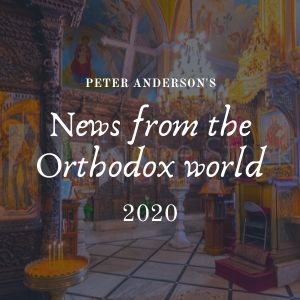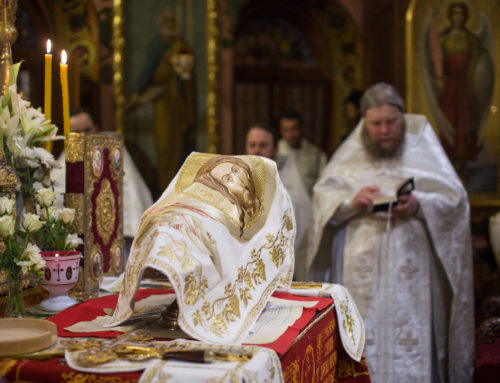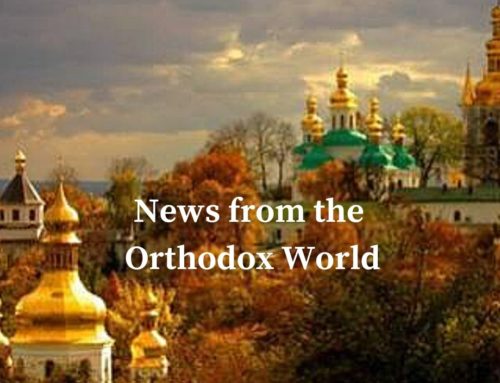Peter Anderson reports from the Orthodox world.
Longstanding reporter of the news from the Eastern Church, Peter Anderson shares our dream of a unified Christianity. His love for Orthodoxy has driven him to this personal mission to share the news of East with the world through his email list. The Urbi et Orbi Foundation is proud to share his efforts and his insights with you.

During the last two weeks, a number of important events have occurred in Ukraine. On December 9, a meeting of the Holy Synod of the UOC-MP was held. The meeting coincided with the 30th anniversary of the ordination of Metropolitan Onufry. The meeting is summarized at https://news.church.ua/2020/12/09/pidsumki-svyashhennogo-sinodu-upc-vid-7-grudnya-2020-roku/ Of particular interest is the response of the UOC-MP to the October 6 statement by Ecumenical Patriarch Bartholomew (https://cerkvarium.org/dokumenty/tserkovni/vidpovid-vselenskogo-patriarkha-tserkvariumu-shchodo-kanonichnogo-statusu-upts-mp ) that Onufry can no longer be considered the canonical Metropolitan of Kyiv. An English translation of the response of the Holy Synod of the UOC-MP is found at https://orthochristian.com/135968.html. The response includes the following: “His Beatitude Metropolitan Onufry of Kyiv and All Ukraine was never in the jurisdiction of the Patriarchate of Constantinople, and therefore the decisions of this Church regarding him have no canonical grounds. His Beatitude Metropolitan Onufry was not removed from the administration of the Kyiv Metropolia and the Ukrainian Orthodox Church by any legal ecclesiastical court, and therefore there are no canonical grounds to say that he lost his authority as the canonically-elected and enthroned Metropolitan of Kyiv and All Ukraine.”
On December 12, Metropolitan Emmanuel of France (Ecumenical Patriarchate) arrived in Kyiv for the celebration of the second anniversary of the “Unity Council” that created the OCU. On December 13 (the feast of St. Andrew old style), he celebrated the Divine Liturgy in the spectacular St. Andrew Church, designed by Rastrelli. It was the first liturgy in the church after the completion of an 11-year restoration. https://orthodoxtimes.com/metropolitan-of-france-at-the-stavropegial-church-of-st-andrew-in-kyiv/ Two years ago, the government of Ukraine gave the Ecumenical Patriarchate certain rights of use to the Church, which is now considered a stavropegial church of Constantinople. It will be the church of the Patriarchate’s exarch in Kyiv, Bishop Michael (Anischenko) of Komana. The church remains the property of the State and a State museum, except for Sundays and special days at which times regularly scheduled church services will be held by the Ecumenical Patriarchate. https://www.stavropigiainua.org/ (website of the Stavropigia)
On December 15, the second anniversary date, the OCU held a Divine Liturgy and a council of bishops in the Little Sophia Church, the 18th -century refectory church on the grounds of the St. Sophia museum complex. https://www.pomisna.info/uk/vsi-novyny/vidbuvsya-drugyj-arhiyerejskyj-sobor-ob-yednanoyi-pravoslavnoyi-tserkvy-ukrayiny/ Greetings were read from the four primates (Constantinople, Alexandria, Cyprus, and Greece) that have recognized the OCU. Following the anniversary council, a prayer service and addresses by Metropolitan Epifany and Metropolitan Emmanuel were held in the 11th-century historic St. Sophia Cathedral. A video of the entire service and addresses in the Cathedral can be viewed at https://www.youtube.com/watch?v=eQ4s1n782q8. The UOC-MP has protested the action of the government in allowing the OCU to use the Cathedral for its service, while denying a request by the UOC-MP to use the Cathedral last October. https://news.church.ua/2020/12/15/pcu-dozvoleno-te-shho-ne-dozvoleno-upc-v-sofiji-kijivskij-proveli-moleben-popri-obmezhennya-z-pandemijeyu/
At the meeting of the UOC-MP Synod, Metropolitan Anthony of Boryspil gave a report on the life of the church in 2020. https://news.church.ua/2020/12/09/zvit-keruyuchogo-spravami-ukrajinskoji-pravoslavnoji-cerkvi-za-2020-rik/ A similar report with respect to the OCU was given by Metropolitan Epifany at the council of bishops. https://www.pomisna.info/uk/vsi-novyny/dopovid-predstoyatelya-na-arhiyerejskomu-sobori-15-grudnya-2020-roku/ Both reports give current statistics. I have compared some of these statistics below.
OCU report: “As of today, the Local Ukrainian Orthodox Church consists of 44 dioceses, which in Ukraine unite more than 7,000 parishes, about 80 monasteries and convents. We have 9 higher theological educational institutions with 1,050 students…. Services in our Church are performed by more than 4.5 thousand clergy, including 60 bishops, 47 of whom are eparchial.”
UOC-MP report: A table in the report of the UOC-MP provides the following numbers for each of the above categories: 53 diocese; 12,374 parishes; 255 monasteries; 18 theological educational institutions with 1,531 full-time students; 12,456 clergy; 108 bishops, with 53 eparchial. It appears that these figures from the UOC-MP include the Crimea, Donetsk, and Luhansk regions which are not under the control of the Ukrainian government.
When one compares these numbers, the UOC-MP is substantially larger in every respect. On the other hand, the October 2020 poll conducted by the Razumkov Center shows that more respondents identify with the OCU than with the UOC-MP. https://razumkov.org.ua/uploads/article/2020_religiya.pdf (page 15) With respect to the question, “To which Orthodox Church do you belong?”, total responses for all Ukrainian areas surveyed were as follows: OCU – 18.6%; UOC-MP – 13.6%; Just Orthodox – 27.0%. With respect to the regions, the breakdown between the two churches is as follows: West – OCU 24.4% & UOC-MP 12.7%; Central – OCU 23.5% & UOC-MP 12.4%; South – OCU 18.8% & UOC-MP 7.5%; East – OCU 6.0% & UOC-MP 18.8%. The poll did not include the Crimea, Donetsk, and Luhansk regions. If these areas were included in the poll, the percentage for the UOC-MP with respect to total responses would be increased to some degree. However, the concentration of parishes and the degree of religious practice in these three regions are not as great as, for example, in Western Ukraine, so that the addition of these three areas to the total may not result in a great difference.
One wonders if the larger number for the OCU can also be explained on the grounds that the OCU numbers include more respondents who go to church only infrequently. With respect to the frequency of attendance at services, the poll shows the percentage of at least weekly attendance as follows: OCU – 23.1%; UOC-MP – 26.4%; Just Orthodox – 6.8%. (page 24) Although the weekly participation by the UOC-MP is higher than the OCU, the difference is probably not great enough to provide a complete explanation to the higher figures for the OCU in the first question. Another possible explanation is that there are persons who identify with OCU but who attend a UOC-MP parish because it is close to their home or is the only church in their community. I do not pretend to have a definite answer to the divergences between the statistics and the polls.
The Council of Bishops of the Polish Orthodox Church has issued an appeal for a united Orthodoxy. https://news.church.ua/2020/12/14/polskaya-pravoslavnaya-cerkov-napravila-pismo-predstoyatelyu-upc-v-kotorom-vyrazhaetsya-zabota-o-edinstve-pravoslaviya-v-sovremennom-mire/ An English translation is provided at https://orthochristian.com/136109.html As far as I can determined, the appeal has not been publicized by the Polish Church, and the only copy that has been the subject of media reporting is the one sent to Metropolitan Onufry (UOC-MP). RIA-Novosti has obtained a clarification of the appeal from the office of Metropolitan Sawa. https://ria.ru/20201217/pravoslavie-1589800786.html According to the clarification, the appeal was sent to “the primates of the local churches, including Onufry,” and does not reflect a change in attitude by the Polish Church with respect to Ukraine – Epifany remains “a secular man.” The key messages of the appeal appear to be that state borders can play no significant role in the Orthodox spiritual mission and that with respect to primacy, “the first will be he who extends a hand of reconciliation.”
With respect to Belarus, Pope Francis has sent Archbishop Claudio Gugerotti, as his special envoy, to meet with President Lukashenko. According to the Vatican’s press office, the purpose of the visit is “to express the Holy Father’s concern and solicitude for the current situation in the country.”
https://www.catholicnewsagency.com/news/pope-francis-sends-special-envoy-to-meet-with-belarus-president-90382 From this, it appears that the purpose is not simply to discuss the situation of the Catholic Church in Belarus and the exile of Archbishop Kondrusiewicz, but also the broader situation in the country. Archbishop Gugerotti was the apostolic nuncio to Belarus from 2011 to 2015, nuncio to Ukraine from 2015 to 2020, and is now nuncio to the UK. The Archbishop’s meeting with Lukashenko occurred on December 17. The press release of the President’s office includes some of the pleasantries exchanged, but does not describe the subjects discussed. https://president.gov.by/en/news_en/view/meeting-with-special-envoy-of-pope-francis-claudio-gugerotti-25082/ The following is a three-minute video showing the two chatting back and forth in Russian in light-hearted fashion. https://www.youtube.com/watch?v=_ppeWv1t6-M&feature=emb_logo Later in the day, the Archbishop met separately with the Minister of Foreign Affairs of Belarus, Vladimir Makei. https://mfa.gov.by/en/press/news_mfa/f529309ae68ad42d.html It should be noted that when Archbishop Gallagher visited Belarus in September, there was not a meeting with Lukashenko. Presumably, there was a meeting this time because Gugerotti came as the Pope’s special envoy.
Bishop Yury Kasabutsky, the vicar general who is heading the Catholic Church in Belarus in the absence of Kondrusiewicz, gave an interesting interview to the Catholic news agency SIR on December 10. https://www.agensir.it/europa/2020/12/10/preti-arrestati-mons-kasabutsky-minsk-ci-vogliono-zittire-ma-noi-non-abbiamo-paura/ He discusses the four Catholic priests who have been arrested. He states: “In general, throughout Belarus, we are living under a system of repression, and the Catholic Church also suffers this repression.” He acknowledged that he had been given an official warning from the government concerning his statements and that he was informed that he would be arrested if he does not stop. In the interview he stated: “I told them I didn’t feel any fear and they wouldn’t scare me.” Sviatlana Tsikhanouskaya, the leader of the Belarus opposition, has written a letter to Pope Francis based on his latest encyclical Fratelli Tutti. The complete text of her letter in English can be read on her website, https://tsikhanouskaya.org/en/events/news/f46df99254de4dd.html .
In other news, Metropolitan Hilarion has given an interesting interview to RIA Novosti concerning primacy at the universal level and the claims of Constantinople. https://ria.ru/20201206/pravoslavie-1587901676.html He has also given a major interview to the Greek newspaper Ekathimerini covering a number of important topics including Ukraine and the Crete Council. https://mospat.ru/ru/2020/12/13/news189064/ . There is the good news that Metropolitan Chrysostom of Dabro-Bosnia, who is temporarily heading the Serbian Patriarchate after the death of Patriarch Irinej, has recovered from the Covid virus. https://www.spc.rs/sr/saopshtenje_za_javnost_55 The Serbian Patriarchate has not yet posted any information as to the date of an assembly to elect a new patriarch. Presumably, it will depend on the course of the pandemic. An Orthodox theologian in Germany has expressed his concerns relating to a proposed agreement between the Catholic and Evangelical Churches in Germany relating to inter-communion. https://www.settimananews.it/ecumenismo-dialogo/ospitalita-eucaristica-timori-ortodossi/ The Vatican also has concerns. The first of a series of lectures, sponsored by the Huffington Ecumenical Institute and entitled “Orthodox – Catholic Conversations,” has been posted at https://www.youtube.com/watch?v=WA_cVz5LCe8&feature=youtu.be&fbclid=IwAR1IdRUNJmE2REiLueXbXRNxJdKC6b9w7Kh_2jTQZIfYYaZOb6G-p4JBIT8 . The conversation was hosted by Sister Vassa Larin (ROCOR) with guests Father Cyril Hovorun (noted Ukrainian Orthodox) and Father Mark Morozowich (dean of the theological faculty at Catholic University and a Ukrainian Catholic). I really enjoyed watching it. I was very impressed that these three, coming from different churches, were able to discuss topics with such friendship and goodwill.
Lastly, I hope that all of you who are celebrating Christmas on December 25 will have a very blessed and joyful Nativity of Our Lord!
Anderson, Seattle USA


